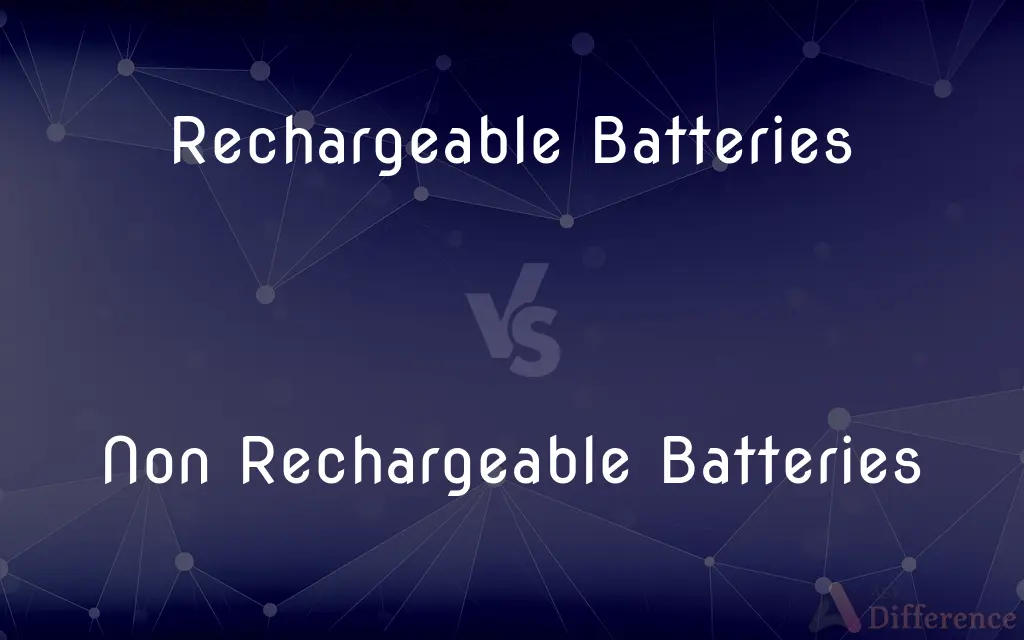Rechargeable Batteries vs. Non Rechargeable Batteries — What's the Difference?
By Tayyaba Rehman — Published on December 21, 2023
Rechargeable Batteries can be reused by recharging after depletion, while Non Rechargeable Batteries are disposed of after a single use.

Difference Between Rechargeable Batteries and Non Rechargeable Batteries
Table of Contents
ADVERTISEMENT
Key Differences
Rechargeable Batteries and Non Rechargeable Batteries serve similar purposes of powering devices, but their lifespans and applications differ significantly. Rechargeable Batteries, as their name suggests, can be recharged multiple times, providing power repeatedly. On the other hand, Non Rechargeable Batteries provide power until they deplete and then must be discarded.
In terms of cost, Rechargeable Batteries might have a higher upfront cost than Non Rechargeable Batteries. However, in the long run, Rechargeable Batteries tend to be more cost-effective due to their capability of being reused. Non Rechargeable Batteries, although cheaper initially, need constant replacement, leading to accumulated costs.
Environmental concerns also come into play when discussing these batteries. Rechargeable Batteries are often deemed more eco-friendly as fewer batteries are discarded, resulting in less waste. Conversely, Non Rechargeable Batteries contribute more to waste if not recycled properly.
From a chemical perspective, the materials and reactions in Rechargeable Batteries are designed to be reversed by applying an external electrical current, allowing them to recharge. Non Rechargeable Batteries have chemical reactions that can't be easily reversed, preventing recharging.
In everyday life, Rechargeable Batteries find their place in devices requiring frequent power, like phones and laptops. Non Rechargeable Batteries, however, are often found in devices with infrequent power needs, such as remote controls or emergency flashlights.
ADVERTISEMENT
Comparison Chart
Reusability
Can be recharged and reused
Single-use; discarded after depletion
Cost
Higher upfront, cost-effective in the long run
Cheaper initially, but frequent replacements add up
Environmental Impact
Less waste; more eco-friendly
More waste if not recycled properly
Chemical Properties
Chemical reactions can be reversed
Chemical reactions can't be easily reversed
Common Uses
Phones, laptops, cameras
Remote controls, emergency flashlights
Compare with Definitions
Rechargeable Batteries
Suitable for devices needing frequent power.
For gadgets I use daily, I always choose Rechargeable Batteries.
Non Rechargeable Batteries
Batteries with irreversible chemical reactions.
Once drained, Non Rechargeable Batteries cannot be juiced up again.
Rechargeable Batteries
Higher upfront cost but more cost-effective in the long run.
Though the initial investment was high, the Rechargeable Batteries saved me money over time.
Non Rechargeable Batteries
Batteries meant for a single use cycle.
For the wall clock, I use Non Rechargeable Batteries since it lasts a long time.
Rechargeable Batteries
Power sources with reversible chemical reactions.
Thanks to Rechargeable Batteries, my phone lasts for years without needing a battery change.
Non Rechargeable Batteries
Often cheaper initially but require regular replacements.
The initial cost of Non Rechargeable Batteries is low, but I have to keep buying new ones.
Rechargeable Batteries
Batteries that can be used multiple times by recharging.
I prefer using Rechargeable Batteries in my camera to avoid constant replacements.
Non Rechargeable Batteries
Potential environmental concern if not recycled.
It's essential to recycle Non Rechargeable Batteries to mitigate environmental impact.
Rechargeable Batteries
Environmentally friendly due to less waste production.
Switching to Rechargeable Batteries for my toys reduced the waste I generated.
Non Rechargeable Batteries
Ideal for devices with infrequent power needs.
I use Non Rechargeable Batteries in my emergency flashlight.
Common Curiosities
Do Rechargeable Batteries lose their efficiency over time?
Yes, after multiple recharge cycles, their capacity can diminish.
Why can't Non Rechargeable Batteries be recharged?
Their chemical reactions are not easily reversible, preventing recharging.
Are Rechargeable Batteries always more expensive initially?
Generally, yes, but they can be cost-effective over time due to reuse.
How do I dispose of Non Rechargeable Batteries?
Ideally, recycle them through proper channels to minimize environmental impact.
How long do Non Rechargeable Batteries last compared to Rechargeable Batteries?
It varies by device and usage, but Non Rechargeable Batteries generally have a longer single-use life than a single charge cycle of Rechargeable Batteries.
Can Rechargeable Batteries be recharged indefinitely?
No, Rechargeable Batteries have a limited number of recharge cycles.
Is there a noticeable performance difference between the two types?
It can vary, but high-quality Rechargeable Batteries often provide consistent power output comparable to Non Rechargeable Batteries.
How often should I charge my Rechargeable Batteries for optimal performance?
It varies by battery type and usage; always follow manufacturer recommendations.
Why might someone choose Non Rechargeable Batteries over Rechargeable Batteries?
Initial cost, specific device requirements, or lack of charging facilities might influence the choice.
Can I replace Non Rechargeable Batteries with Rechargeable Batteries in a device?
It depends on the device specifications. Always consult the device's manual.
Can Rechargeable Batteries explode if overcharged?
Yes, if not charged properly, they can be a risk. Always follow manufacturer guidelines.
Are there specific devices best suited for Non Rechargeable Batteries?
Yes, devices with infrequent power needs, like emergency tools, often use them.
How do Rechargeable Batteries impact the environment compared to Non Rechargeable Batteries?
Rechargeable Batteries produce less waste, making them generally more eco-friendly.
Why do Rechargeable Batteries sometimes have a memory effect?
Some types, like NiCd, can "remember" a partial charge level, which reduces their efficiency. Proper charging can mitigate this.
Do Non Rechargeable Batteries leak?
They can, especially if stored improperly or exposed to extreme conditions.
Share Your Discovery

Previous Comparison
Hexane vs. n-Hexane
Next Comparison
Cast Iron vs. Cast SteelAuthor Spotlight
Written by
Tayyaba RehmanTayyaba Rehman is a distinguished writer, currently serving as a primary contributor to askdifference.com. As a researcher in semantics and etymology, Tayyaba's passion for the complexity of languages and their distinctions has found a perfect home on the platform. Tayyaba delves into the intricacies of language, distinguishing between commonly confused words and phrases, thereby providing clarity for readers worldwide.
















































